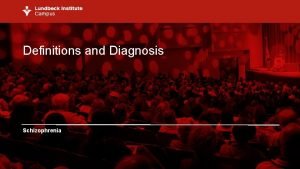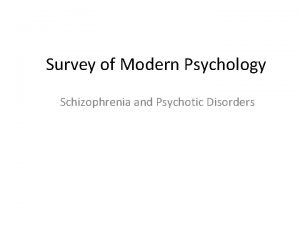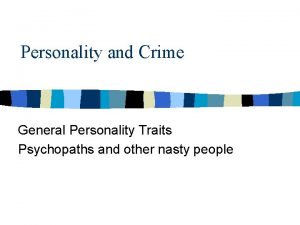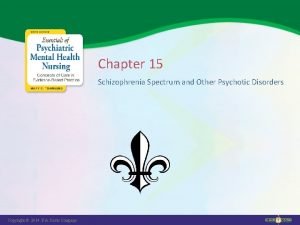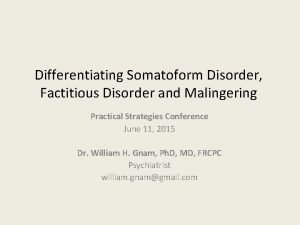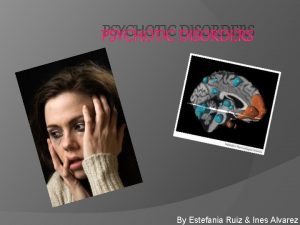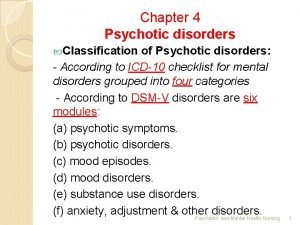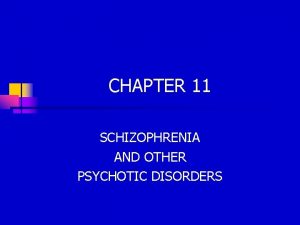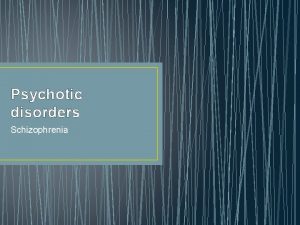Shared Psychotic Disorder Aka folie deux Chiara Speranza










- Slides: 10

Shared Psychotic Disorder Aka: folie à deux Chiara Speranza & Tre’Vaughn Jones

Symptoms of Shared Psychotic disorder ● A delusion develops in an person in a close relationship with another person who has an already-established delusion. ● The delusion is similar in content to that of the person who already has the established delusion. ● The disturbance is not better accounted for by another psychotic disorder or a mood disorder with psychotic features and is not due to the direct physiological effects of a substance or a general medical condition.

Further Understanding For example, let’s say your spouse has a psychotic disorder and, as part of that illness, believes aliens are spying on him or her. If you have a shared psychotic disorder, you’ll start to believe in the spying aliens. But apart from that, your thoughts and behavior are normal

Causes of Shared Psychotic Disorder Usually happens when a “healthy” person is around a person with some kind of psychotic disorder Can only happen within a long-term relationship or a group of people with a close emotional connection Typically happens in a relationship where the person with the disorder is dominant Can be shared with more than two people (less

Diagnosis Since this disorder doesn’t technically have its own symptoms, its not very easy to diagnose someone with Shared Psychotic Disorder. Doctors will typically use tools like MRIs and blood tests to rule out other causes. If they don’t find any physical reason for the symptoms the doctor will refer them to a psychiatrist or psychologist. These mental health experts will talk to the person, listen to their symptoms, observe their attitude and behavior, and want to know if the person is close to someone who is known to have delusions.

Why Not Seek Treatment? People with Shared Psychotic Disorder don’t usually seek help just simply because they’re not sure what it is. Because it’s so uncommon alot of people have never even heard of it. There is also many people who believe it’s just made up or a placebo effect

Treatment Because Shared Psychotic Disorder is so rare, there aren’t many effective treatment methods for it The typical method is to just separate the person with the shared disorder from the person with the psychotic disorder Obviously, this doesn’t always work so another method is psychotherapy

Psychotherapy This type of counseling can help someone recognize the delusions and get back to healthy thinking. This is often hard because a person with the delusional disorder may not be able to see the problems in their thinking. Psychotherapy also aims to ease emotional distress from the condition and the relationship with the mentally ill person.

Statistics The number of cases is unknown, but shared psychotic disorder is rarely seen in clinical settings, such as hospitals, outpatient clinics, or doctors' offices. In many cases, only one of the affected individuals seeks treatment, making a diagnosis of shared psychotic disorder difficult. As a result, many cases might go undetected. Approximately 55% of secondary cases of the disorder have first-degree relatives with psychiatric disorders, not including the primary partner. This is not true of individuals with the primary diagnosis, as they showed a roughly 35% incidence.

Online and Local Services You could search up any concerns you have about this disorder and find information on it, you can get reliable information from websites such as mentalhelp. com and allaboutcounseling. com. For local help go to your nearest doctor or psychiatrist and receive help and a solid determination of what your disorder is.


